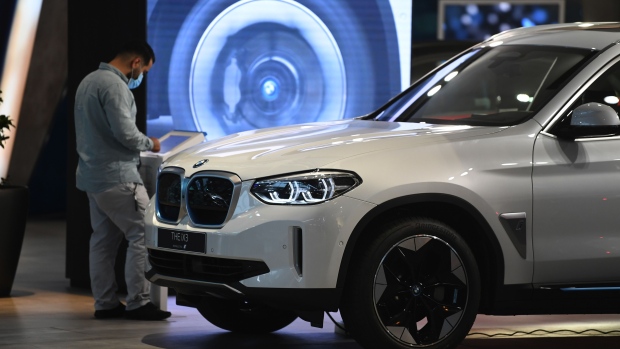Nov 3, 2022
BMW Earnings, Sales Rise on Higher Prices for its Top-End Cars
, Bloomberg News

(Bloomberg) -- Europe’s inflation crisis is beginning to catch up with automakers.
Stellantis NV on Thursday said consumers in Europe are slightly dialing back car purchases, joining Germany’s BMW AG in warning the region is on the backfoot due to surging costs for anything from energy to lending.
Carmakers long defied economic headwinds thanks to robust demand for their priciest models, with Stellantis and BMW reporting rising sales and earnings on Thursday, and Mercedes-Benz AG raising its outlook for the second consecutive quarter last month. Still, economic headwinds are building. Volkswagen AG last week cut its sales projection for the year, citing scarce semiconductor availability and persisting logistics challenges.
Demand in Europe “will level off slightly” as some markets experience double-digit inflation rates, BMW Chief Financial Officer Nicolas Peter said on a call with reporters. The trend is more pronounced in northern European countries than in the South, including France and Italy, where cost increases have been less prevalent.
BMW declined as much as 6.5% in Frankfurt, the steepest intraday drop since August, and was 4.8% lower at 12:17 p.m. Stellantis fell as much as 3.2% in Paris.
Logistics Issues
So far, the auto industry has been shielded from the downturn by pent-up demand as parts shortages and logistics issues continue to weigh on production.
Stellantis’s vehicle inventory has ballooned 54% to 275,000 units since the start of the year -- orders that should protect the maker of Ram pickups and Fiat cars in the near term, according to Chief Financial Officer Richard Palmer. Still, the executive said he’s “carefully” watching how future orders develop.
“The macro environment is clearly very challenging, particularly in Europe,” Palmer said on a call with reporters. “I wouldn’t be at all surprised if we were to see some demand softening into the middle over next year.”
BMW reported better-than-expected earnings in the third quarter as higher prices for the carmaker’s top-end models helped offset flat deliveries. But the manufacturer only confirmed its full-year guidance, which may disappoint some investors who were expecting a forecast hike, RBC analyst Tom Narayan said in a note.
BMW doesn’t currently anticipate production disruptions due to energy shortages this year and sees a jump in vehicle deliveries in the current quarter from the three months through September.
As the outlook darkens, automakers are under pressure to finance ambitious electric-car rollout plans. Stellantis is targeting more than 75 fully electric models by 2030 with annual sales of 5 million vehicles, while maintaining double-digit returns over that time.
BMW sees sales of EVs like its iX3 sport utility vehicle jumping 70% next year after they more than doubled in the first nine months of this year.
Last month, the German carmaker said it’s investing $1.7 billion to expand its US plant in South Carolina to build six new EV models by the end of this decade for the local market.
(Updates with BMW CFO comment in fourth paragraph)
©2022 Bloomberg L.P.





